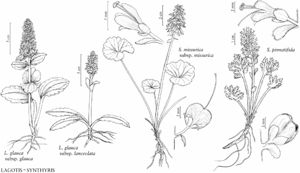Property:Hair-tuft
FNA>Volume Importer |
FNA>Volume Importer |
||
| Line 1: | Line 1: | ||
| − | + | {{Treatment/ID | |
| − | + | |accepted_name=Lagotis glauca subsp. glauca | |
| − | + | |accepted_authority=unknown | |
| − | == | + | |publications= |
| − | {{ | + | |special_status={{Treatment/ID/Special_status |
| − | == | + | |code=F |
| − | {{# | + | |label=Selected by author to be illustrated |
| + | }} | ||
| + | |basionyms= | ||
| + | |synonyms= | ||
| + | |hierarchy=Plantaginaceae;Lagotis;Lagotis glauca;Lagotis glauca subsp. glauca | ||
| + | |hierarchy_nav=<div class="higher-taxa"><div class="higher-taxon"><small>family</small>[[Plantaginaceae]]</div><div class="higher-taxon"><small>genus</small>[[Lagotis]]</div><div class="higher-taxon"><small>species</small>[[Lagotis glauca]]</div><div class="higher-taxon"><small>subspecies</small>[[Lagotis glauca subsp. glauca]]</div></div> | ||
| + | |volume=Volume 17 | ||
| + | |mention_page=page 296 | ||
| + | |treatment_page=page 295 | ||
| + | }}<!-- | ||
| + | |||
| + | --><span class="statement" id="st-undefined" data-properties=""><b>Basal </b>leaves 6–16 cm; blade broadly obovate-oblanceolate, 35–80 × 20–65 mm, base truncate, margins crenate-dentate, apex rounded or obtuse, sometimes subacute. <b>Cauline</b> leaves: blade ovate to triangular, margins crenate-dentate. <b>Flowers</b>: filaments to 1.5 mm, often shorter than to as long as anthers. <b>2n</b> = 22.</span><!-- | ||
| + | |||
| + | -->{{Treatment/Body | ||
| + | |phenology=Flowering summer. | ||
| + | |habitat=Coastal tundra meadows. | ||
| + | |elevation=0–1100 m. | ||
| + | |distribution=Alaska;e Asia (Russian Far East). | ||
| + | |discussion=<p>Subspecies glauca occurs along the coast of the Alaska Peninsula, Aleutian Islands, Kodiak Island, the Pribilov Islands, and, intermittently, to Teller on the Seward Peninsula. Transitional basal leaf forms occur where <i></i>subsp.<i> glauca</i> is sympatric with <i></i>subsp.<i> lanceolata</i>; <i></i>subsp.<i> glauca</i> is then distinguished in most cases by having shorter stamen filaments. Some specimens are difficult to place in either subspecies in this zone of contact.</p> | ||
| + | |tables= | ||
| + | |references= | ||
| + | }}<!-- | ||
| + | |||
| + | --><!-- | ||
| + | |||
| + | -->{{#Taxon: | ||
| + | name=Lagotis glauca subsp. glauca | ||
| + | |author= | ||
| + | |authority=unknown | ||
| + | |rank=subspecies | ||
| + | |parent rank=species | ||
| + | |synonyms= | ||
| + | |basionyms= | ||
| + | |family=Plantaginaceae | ||
| + | |phenology=Flowering summer. | ||
| + | |habitat=Coastal tundra meadows. | ||
| + | |elevation=0–1100 m. | ||
| + | |distribution=Alaska;e Asia (Russian Far East). | ||
| + | |reference=None | ||
| + | |publication title= | ||
| + | |publication year= | ||
| + | |special status=Selected by author to be illustrated | ||
| + | |source xml=https://jpend@bitbucket.org/aafc-mbb/fna-data-curation.git/src/8f726806613d60c220dc4493de13607dd3150896/coarse_grained_fna_xml/V17/V17_715.xml | ||
| + | |genus=Lagotis | ||
| + | |species=Lagotis glauca | ||
| + | |subspecies=Lagotis glauca subsp. glauca | ||
| + | }}<!-- | ||
| + | |||
| + | -->[[Category:Treatment]][[Category:Lagotis glauca]] | ||
Revision as of 16:02, 18 September 2019
Basal leaves 6–16 cm; blade broadly obovate-oblanceolate, 35–80 × 20–65 mm, base truncate, margins crenate-dentate, apex rounded or obtuse, sometimes subacute. Cauline leaves: blade ovate to triangular, margins crenate-dentate. Flowers: filaments to 1.5 mm, often shorter than to as long as anthers. 2n = 22.
Phenology: Flowering summer.
Habitat: Coastal tundra meadows.
Elevation: 0–1100 m.
Distribution
Alaska, e Asia (Russian Far East).
Discussion
Subspecies glauca occurs along the coast of the Alaska Peninsula, Aleutian Islands, Kodiak Island, the Pribilov Islands, and, intermittently, to Teller on the Seward Peninsula. Transitional basal leaf forms occur where subsp. glauca is sympatric with subsp. lanceolata; subsp. glauca is then distinguished in most cases by having shorter stamen filaments. Some specimens are difficult to place in either subspecies in this zone of contact.
Selected References
None.
